Resume
Machine Learning Intern Cover Letter Examples

May 29, 2025
|
12 min read
Craft a standout machine learning intern cover letter that computes to success. Discover key tips to decode employer expectations, showcase your skills, and predict a positive outcome in your job search equation.
4.70 Average rating
Rated by 348 people
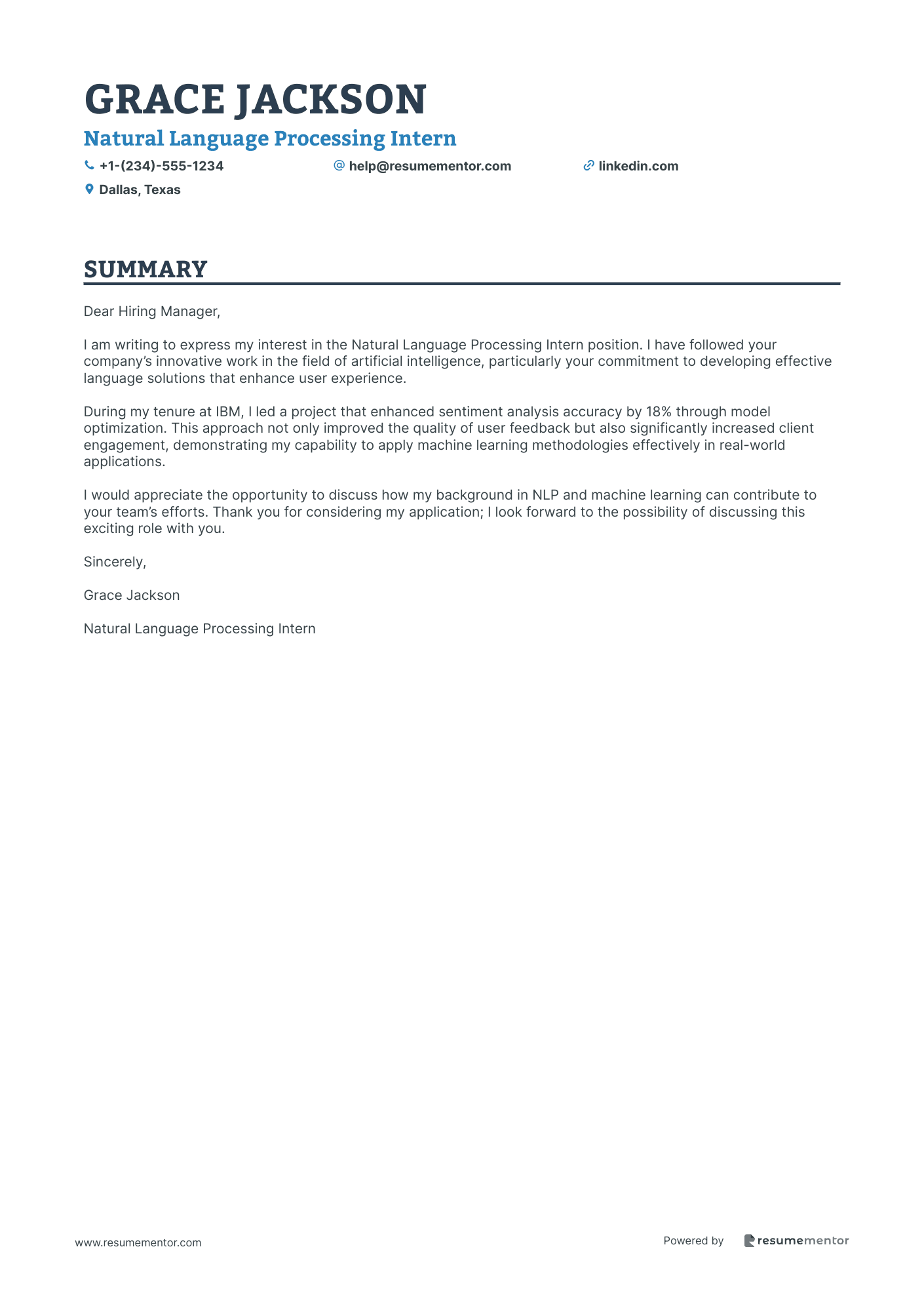
Natural Language Processing Intern
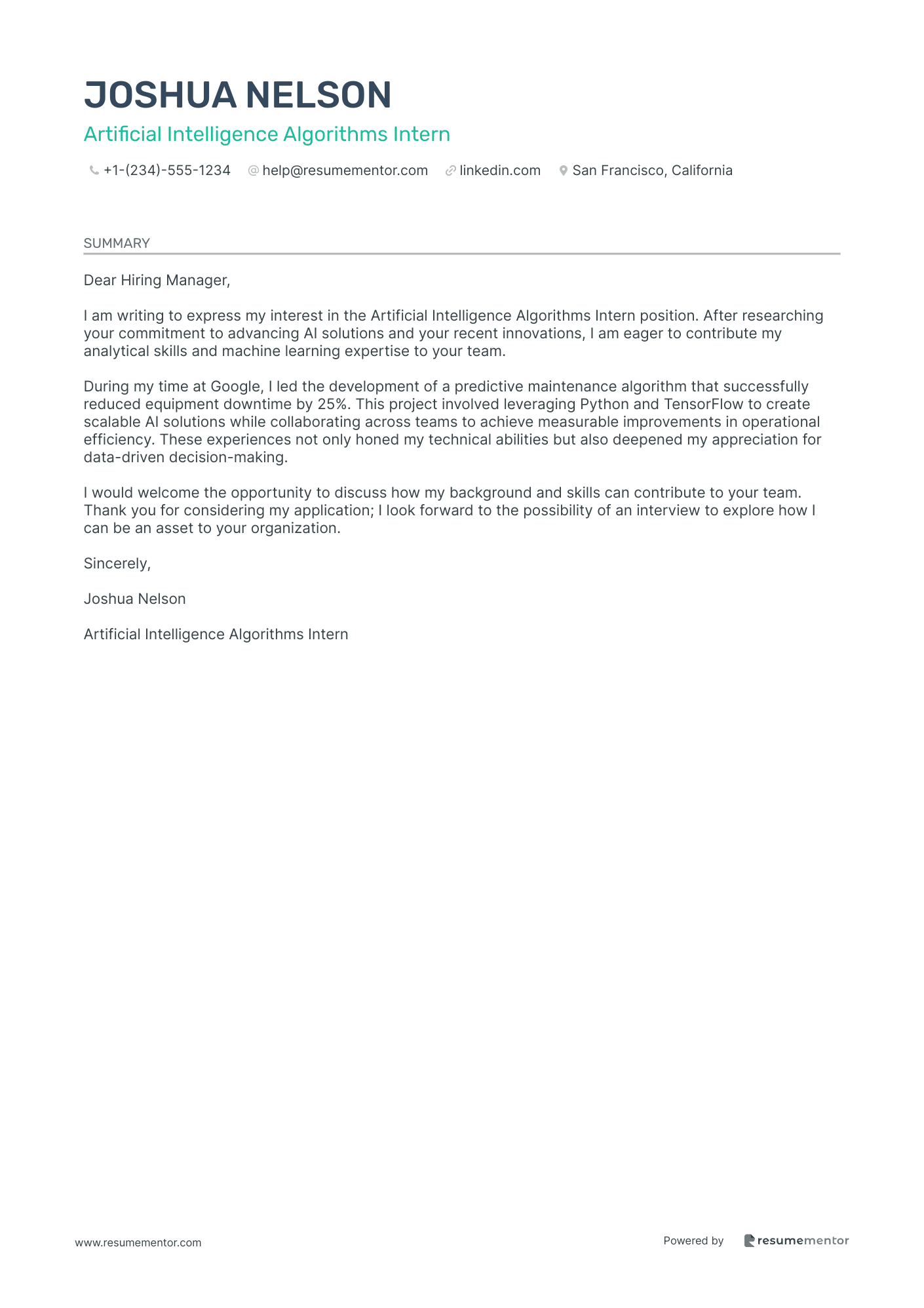
Artificial Intelligence Algorithms Intern
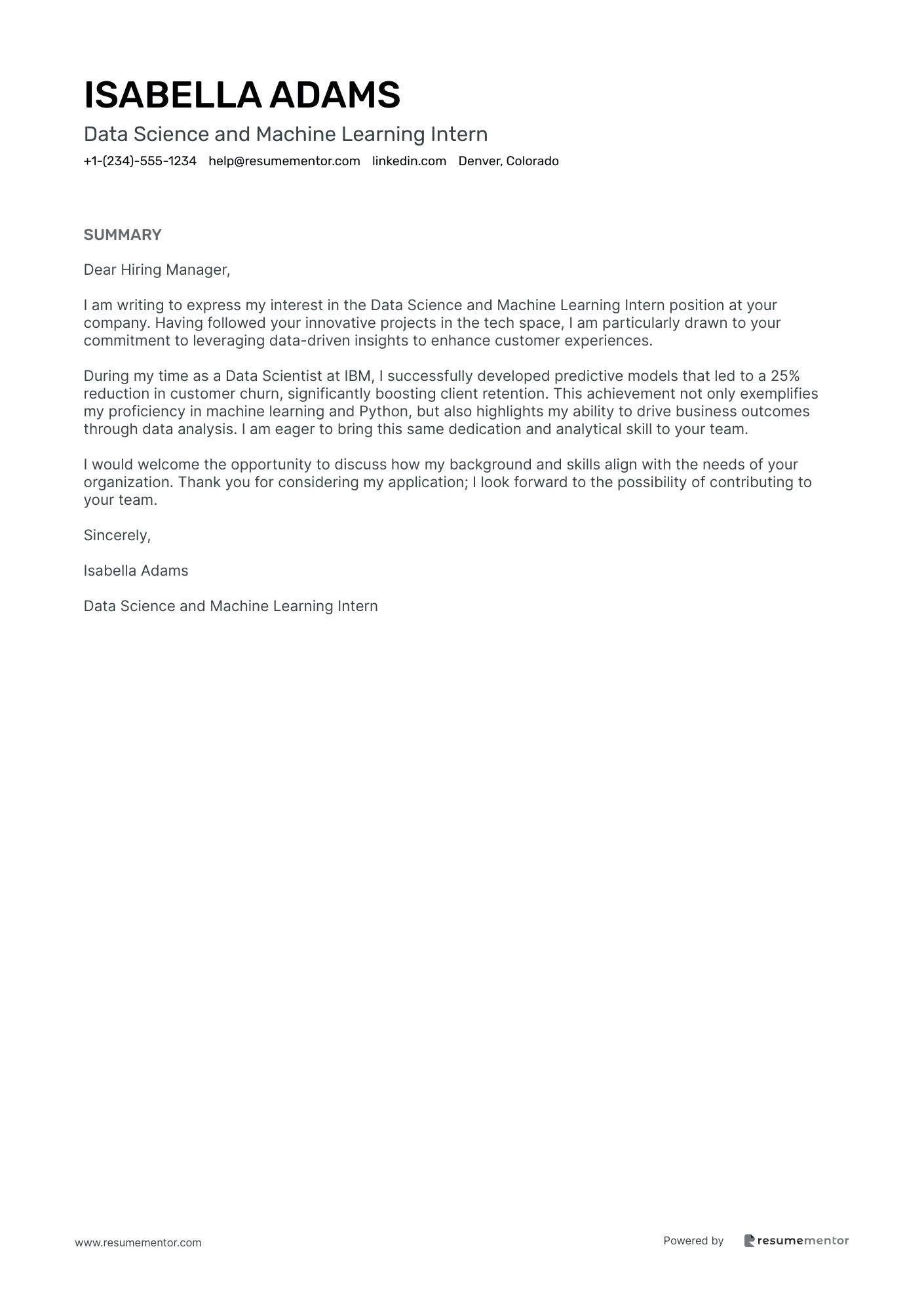
Data Science and Machine Learning Intern
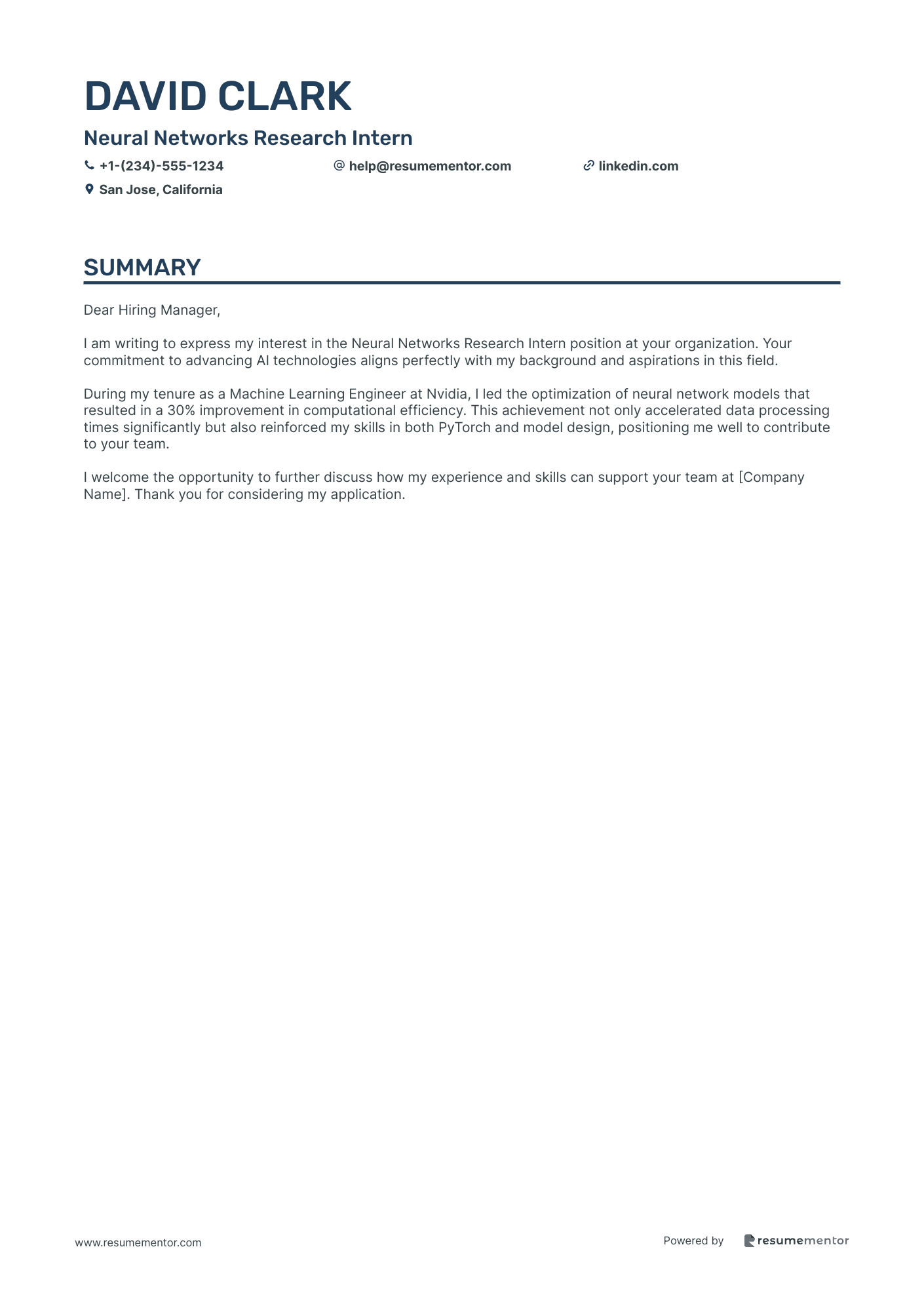
Neural Networks Research Intern
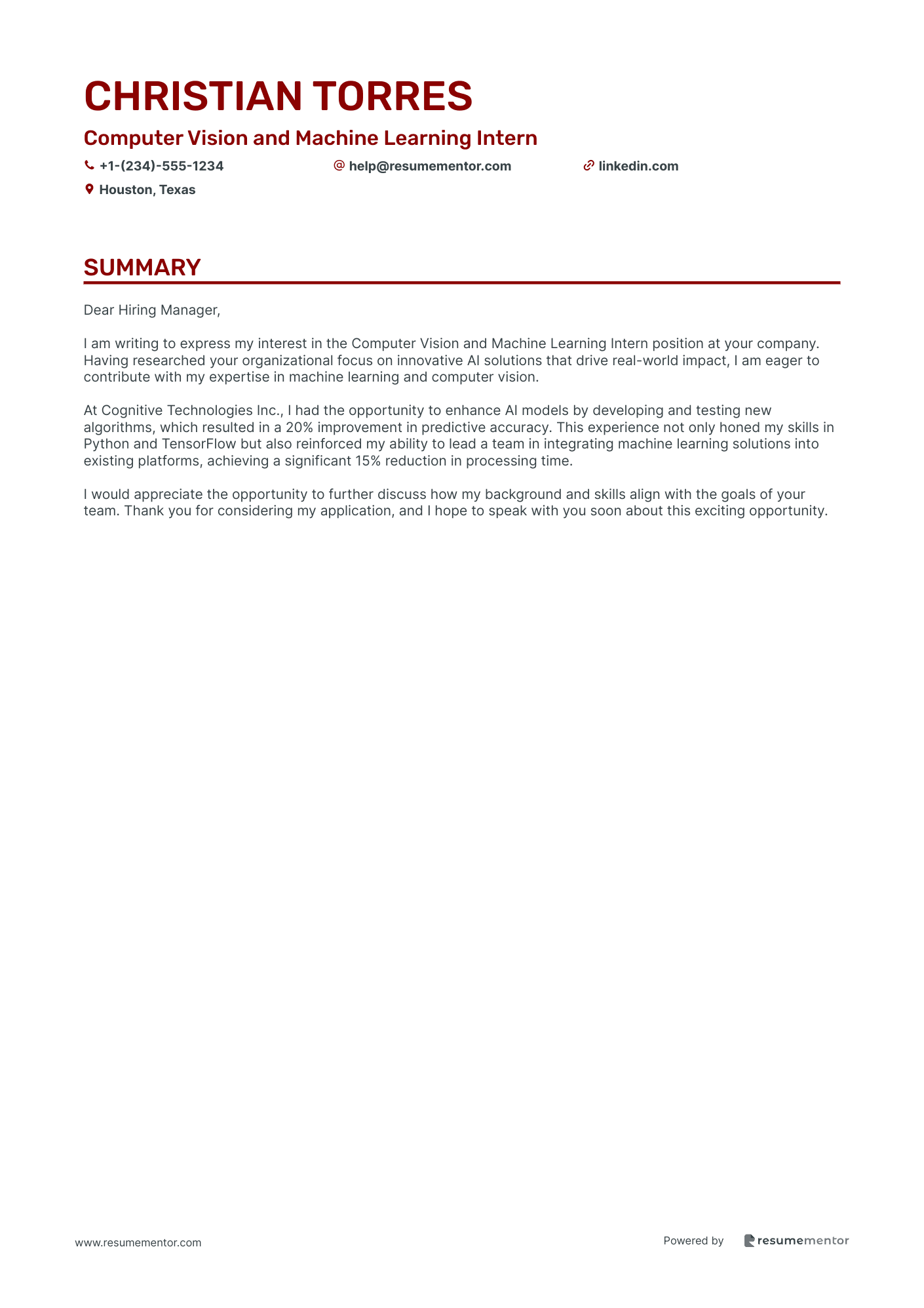
Computer Vision and Machine Learning Intern
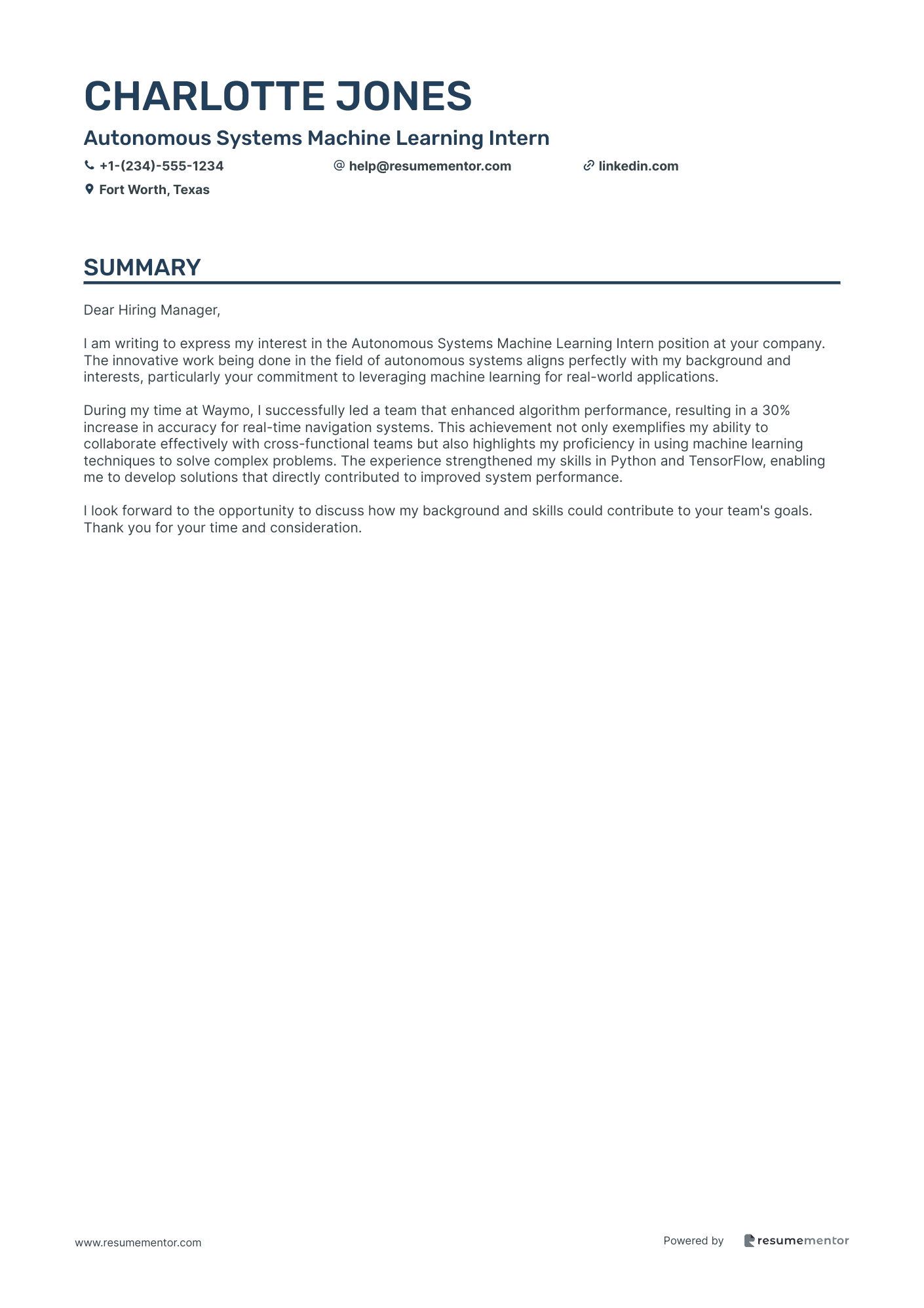
Autonomous Systems Machine Learning Intern
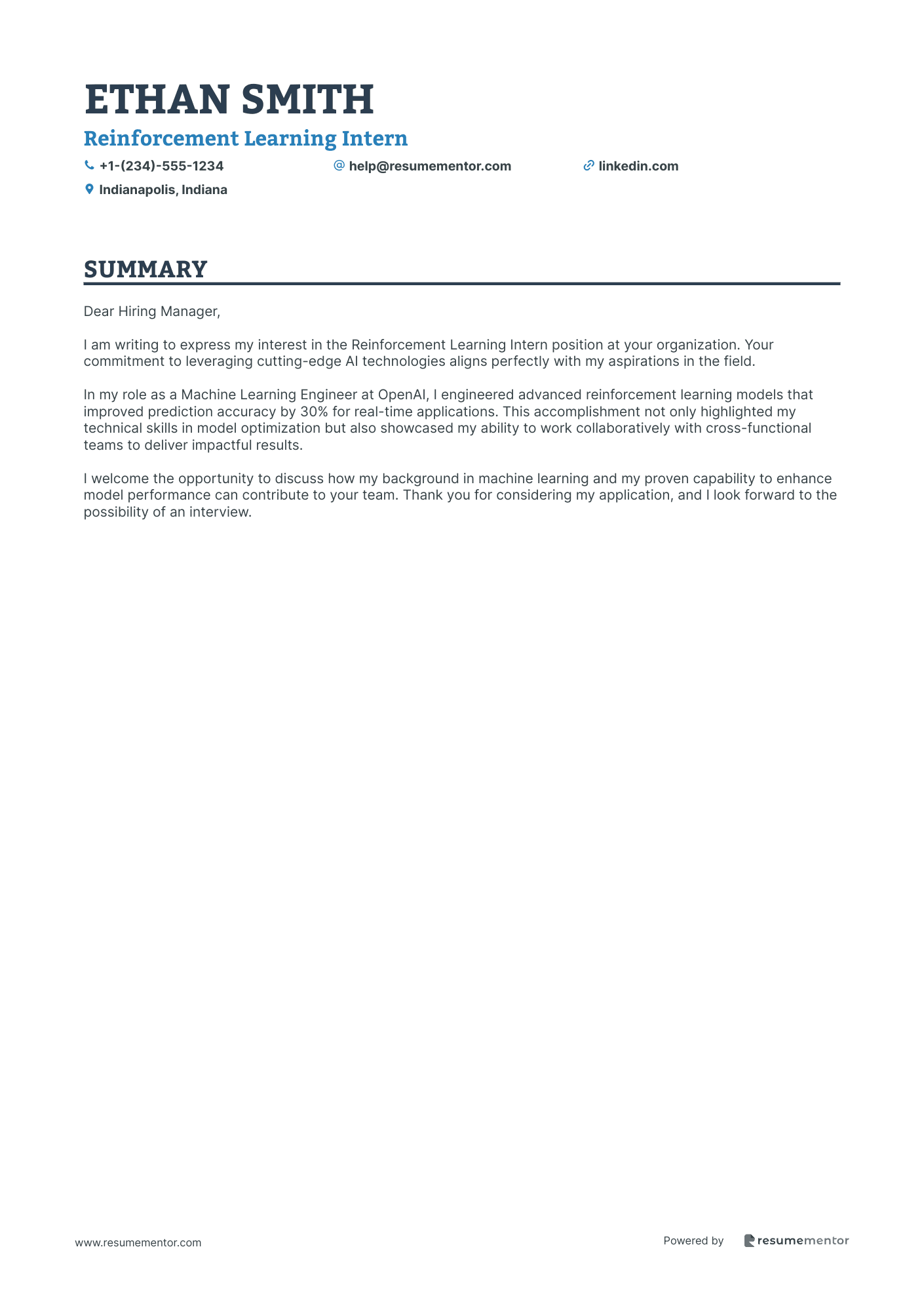
Reinforcement Learning Intern
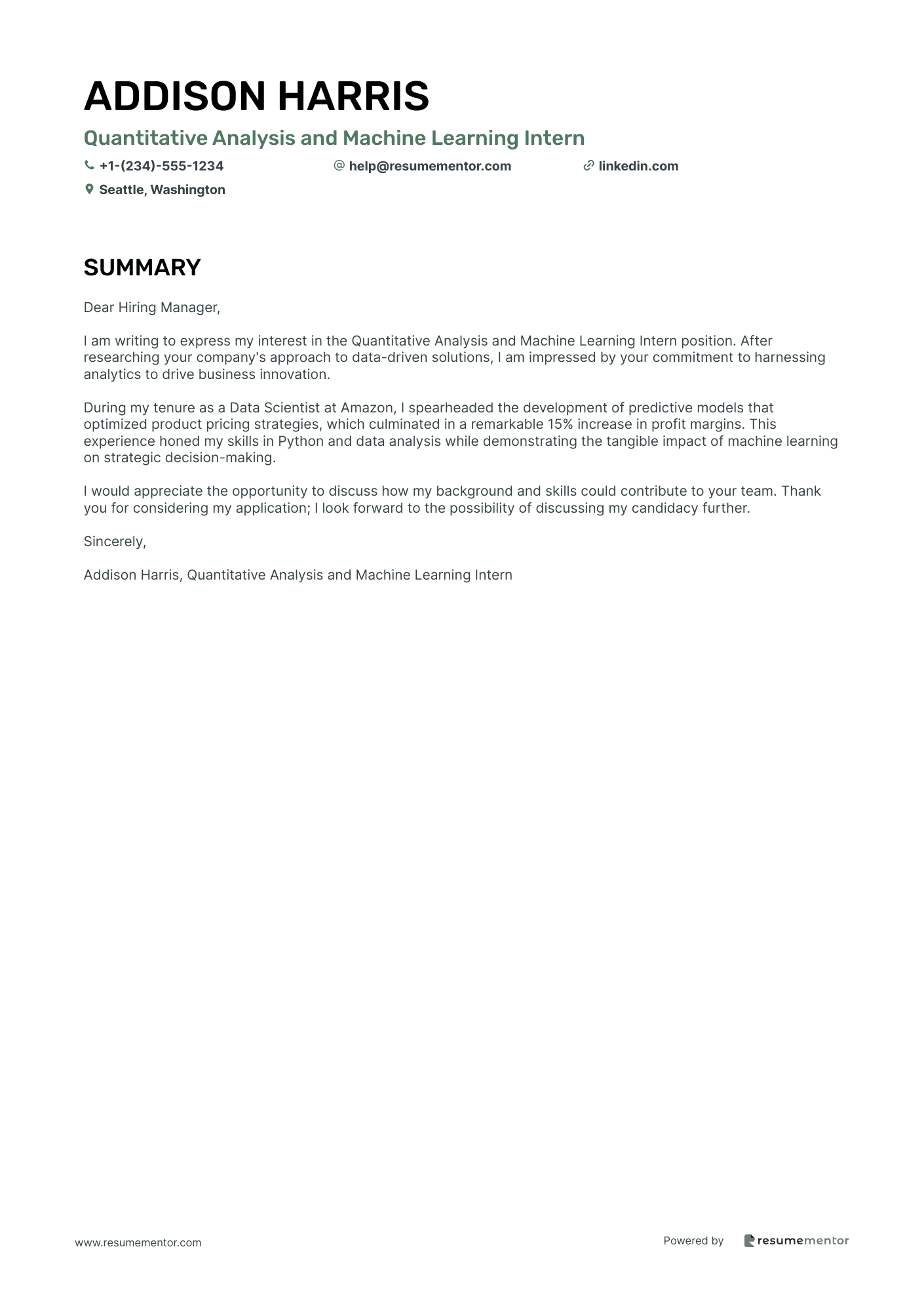
Quantitative Analysis and Machine Learning Intern
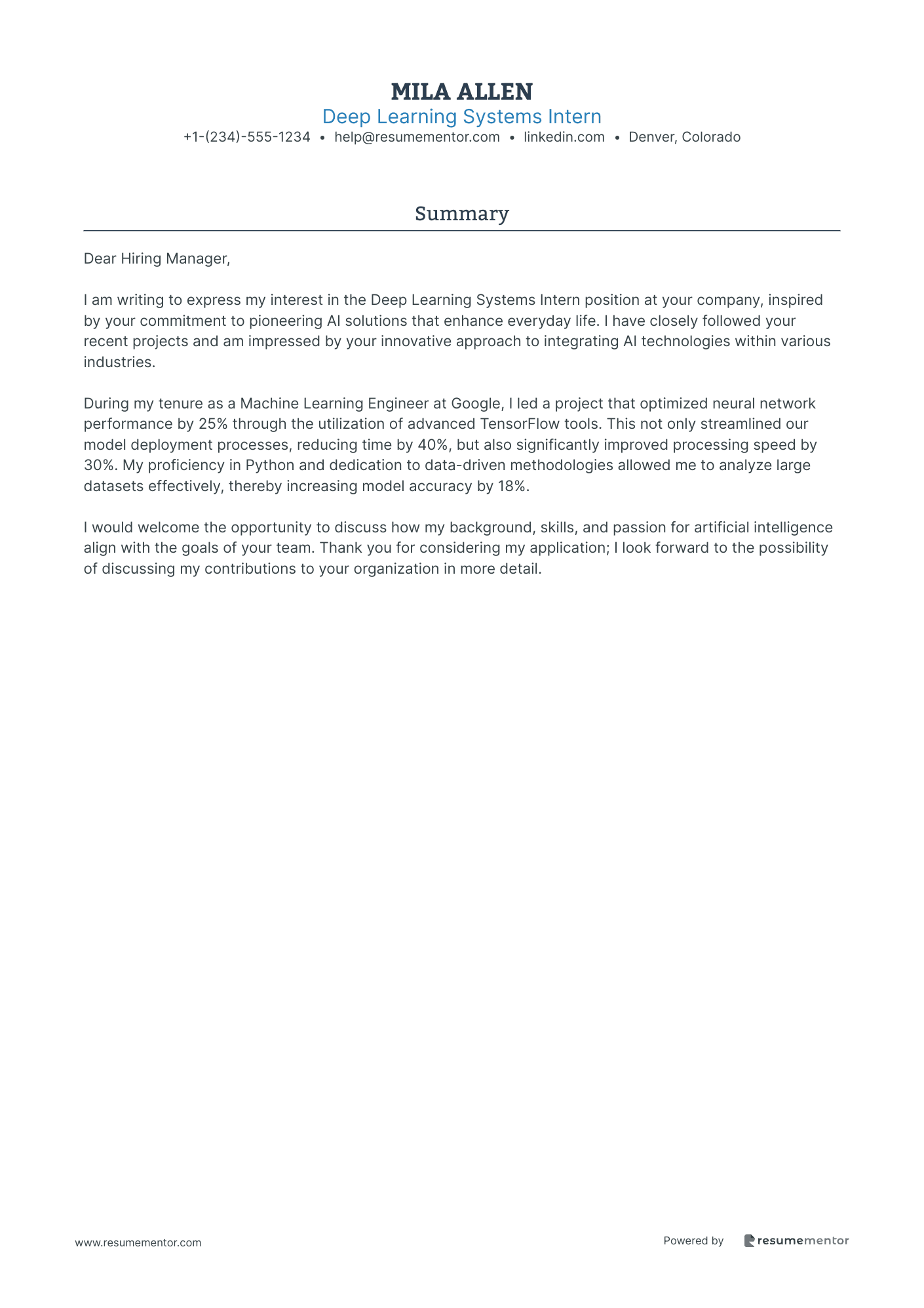
Deep Learning Systems Intern

Natural Language Processing Intern cover letter sample
When applying for this role, highlight your experience with programming languages like Python or Java, especially in libraries such as NLTK or spaCy. Show any relevant coursework in machine learning or data science, and mention specific projects you've completed. Detail your familiarity with algorithms used in text processing and any contributions to open-source projects. Emphasize your problem-solving abilities, citing examples where your work improved outcomes or efficiency. Use metrics to showcase your impact, and align your skills with the needs of the position to strengthen your application.
Grace Jackson
Natural Language Processing Intern
Summary
Dear Hiring Manager,
I am writing to express my interest in the Natural Language Processing Intern position. I have followed your company’s innovative work in the field of artificial intelligence, particularly your commitment to developing effective language solutions that enhance user experience.
During my tenure at IBM, I led a project that enhanced sentiment analysis accuracy by 18% through model optimization. This approach not only improved the quality of user feedback but also significantly increased client engagement, demonstrating my capability to apply machine learning methodologies effectively in real-world applications.
I would appreciate the opportunity to discuss how my background in NLP and machine learning can contribute to your team’s efforts. Thank you for considering my application; I look forward to the possibility of discussing this exciting role with you.
Sincerely,
Grace Jackson
Natural Language Processing Intern
Artificial Intelligence Algorithms Intern cover letter sample
When applying for this position, it’s essential to emphasize any experience with programming languages like Python or R. Highlight familiarity with machine learning frameworks such as TensorFlow or PyTorch. Detail any academic projects or internships related to data analysis or algorithm development, showcasing your practical application of theoretical concepts. Include any coursework on statistics or data structures to demonstrate a solid foundation. Use examples that illustrate how you've optimized processes or solved complex problems using algorithms, using a clear 'skill-action-result' format for greater impact.
Joshua Nelson
Artificial Intelligence Algorithms Intern
Summary
Dear Hiring Manager,
I am writing to express my interest in the Artificial Intelligence Algorithms Intern position. After researching your commitment to advancing AI solutions and your recent innovations, I am eager to contribute my analytical skills and machine learning expertise to your team.
During my time at Google, I led the development of a predictive maintenance algorithm that successfully reduced equipment downtime by 25%. This project involved leveraging Python and TensorFlow to create scalable AI solutions while collaborating across teams to achieve measurable improvements in operational efficiency. These experiences not only honed my technical abilities but also deepened my appreciation for data-driven decision-making.
I would welcome the opportunity to discuss how my background and skills can contribute to your team. Thank you for considering my application; I look forward to the possibility of an interview to explore how I can be an asset to your organization.
Sincerely,
Joshua Nelson
Artificial Intelligence Algorithms Intern
Data Science and Machine Learning Intern cover letter sample
When applying for this role, emphasize any experience with programming languages like Python or R. Mention projects that showcase your skills in data analysis or machine learning algorithms. Highlight any relevant coursework or certifications, such as data visualization techniques or statistics, to demonstrate your foundational knowledge. Include specific examples where your analytical skills led to actionable insights or improved processes, using a 'skill-action-result' format. This will show your ability to apply theory in practical situations, making your application more compelling.
Isabella Adams
Data Science and Machine Learning Intern
Summary
Dear Hiring Manager,
I am writing to express my interest in the Data Science and Machine Learning Intern position at your company. Having followed your innovative projects in the tech space, I am particularly drawn to your commitment to leveraging data-driven insights to enhance customer experiences.
During my time as a Data Scientist at IBM, I successfully developed predictive models that led to a 25% reduction in customer churn, significantly boosting client retention. This achievement not only exemplifies my proficiency in machine learning and Python, but also highlights my ability to drive business outcomes through data analysis. I am eager to bring this same dedication and analytical skill to your team.
I would welcome the opportunity to discuss how my background and skills align with the needs of your organization. Thank you for considering my application; I look forward to the possibility of contributing to your team.
Sincerely,
Isabella Adams
Data Science and Machine Learning Intern
Neural Networks Research Intern cover letter sample
When crafting your cover letter, emphasize any academic projects or research related to machine learning or artificial intelligence. Highlight your programming skills, particularly in languages like Python or TensorFlow, as these are essential for the role. Include any coursework such as 'Introduction to Neural Networks' or participation in relevant workshops. Demonstrate your problem-solving abilities by providing examples of how you’ve developed models or algorithms. Use data to showcase your impact, whether improving accuracy or efficiency in previous projects, emphasizing your analytical mindset.
David Clark
Neural Networks Research Intern
Summary
Dear Hiring Manager,
I am writing to express my interest in the Neural Networks Research Intern position at your organization. Your commitment to advancing AI technologies aligns perfectly with my background and aspirations in this field.
During my tenure as a Machine Learning Engineer at Nvidia, I led the optimization of neural network models that resulted in a 30% improvement in computational efficiency. This achievement not only accelerated data processing times significantly but also reinforced my skills in both PyTorch and model design, positioning me well to contribute to your team.
I welcome the opportunity to further discuss how my experience and skills can support your team at [Company Name]. Thank you for considering my application.
Computer Vision and Machine Learning Intern cover letter sample
When applying for this internship, focus on your experience with programming languages like Python and C++. Mention any projects involving image processing or deep learning frameworks such as TensorFlow or PyTorch. Highlight courses like 'Computer Vision' or 'Machine Learning' you’ve completed, detailing the skills you gained. Include examples of how your work improved accuracy in tasks or solved real-world problems. Use a 'skill-action-result' framework to demonstrate your contributions, showing how you can bring value to the team.
Christian Torres
Computer Vision and Machine Learning Intern
Summary
Dear Hiring Manager,
I am writing to express my interest in the Computer Vision and Machine Learning Intern position at your company. Having researched your organizational focus on innovative AI solutions that drive real-world impact, I am eager to contribute with my expertise in machine learning and computer vision.
At Cognitive Technologies Inc., I had the opportunity to enhance AI models by developing and testing new algorithms, which resulted in a 20% improvement in predictive accuracy. This experience not only honed my skills in Python and TensorFlow but also reinforced my ability to lead a team in integrating machine learning solutions into existing platforms, achieving a significant 15% reduction in processing time.
I would appreciate the opportunity to further discuss how my background and skills align with the goals of your team. Thank you for considering my application, and I hope to speak with you soon about this exciting opportunity.
Autonomous Systems Machine Learning Intern cover letter sample
When crafting your cover letter, focus on highlighting any experience with machine learning frameworks such as TensorFlow or PyTorch. Mention specific projects where you applied algorithms to solve real-world problems, and quantify your impact with metrics, such as accuracy improvements or reduction in processing time. If you have relevant coursework or certifications, such as 'Introduction to Machine Learning' or 'Data Science Bootcamp', be sure to include those. Finally, showcase your passion for autonomous systems and your eagerness to learn, as this can set you apart from other candidates.
Charlotte Jones
Autonomous Systems Machine Learning Intern
Summary
Dear Hiring Manager,
I am writing to express my interest in the Autonomous Systems Machine Learning Intern position at your company. The innovative work being done in the field of autonomous systems aligns perfectly with my background and interests, particularly your commitment to leveraging machine learning for real-world applications.
During my time at Waymo, I successfully led a team that enhanced algorithm performance, resulting in a 30% increase in accuracy for real-time navigation systems. This achievement not only exemplifies my ability to collaborate effectively with cross-functional teams but also highlights my proficiency in using machine learning techniques to solve complex problems. The experience strengthened my skills in Python and TensorFlow, enabling me to develop solutions that directly contributed to improved system performance.
I look forward to the opportunity to discuss how my background and skills could contribute to your team's goals. Thank you for your time and consideration.
Reinforcement Learning Intern cover letter sample
When applying for this opportunity, it's important to showcase any relevant experience with machine learning and programming. Highlight any coursework or projects related to reinforcement learning, such as using frameworks like TensorFlow or PyTorch. If you have worked on any practical applications, describe them clearly. Use specific metrics or outcomes to illustrate the effectiveness of your work. Additionally, emphasize your problem-solving skills and ability to learn quickly, as these qualities are essential for success in a dynamic environment.
Ethan Smith
Reinforcement Learning Intern
Summary
Dear Hiring Manager,
I am writing to express my interest in the Reinforcement Learning Intern position at your organization. Your commitment to leveraging cutting-edge AI technologies aligns perfectly with my aspirations in the field.
In my role as a Machine Learning Engineer at OpenAI, I engineered advanced reinforcement learning models that improved prediction accuracy by 30% for real-time applications. This accomplishment not only highlighted my technical skills in model optimization but also showcased my ability to work collaboratively with cross-functional teams to deliver impactful results.
I welcome the opportunity to discuss how my background in machine learning and my proven capability to enhance model performance can contribute to your team. Thank you for considering my application, and I look forward to the possibility of an interview.
Quantitative Analysis and Machine Learning Intern cover letter sample
When applying for this opportunity, focus on your programming skills in languages like Python or R. Highlight any coursework in statistics, data science, or machine learning. If you have completed projects involving data analysis or predictive modeling, include those to demonstrate practical knowledge. Showcase your ability to work with large datasets and any experience using tools like TensorFlow or Scikit-learn. Discuss how your analytical skills have improved decision-making in previous roles, stressing tangible outcomes using the 'skill-action-result' framework.
Addison Harris
Quantitative Analysis and Machine Learning Intern
Summary
Dear Hiring Manager,
I am writing to express my interest in the Quantitative Analysis and Machine Learning Intern position. After researching your company's approach to data-driven solutions, I am impressed by your commitment to harnessing analytics to drive business innovation.
During my tenure as a Data Scientist at Amazon, I spearheaded the development of predictive models that optimized product pricing strategies, which culminated in a remarkable 15% increase in profit margins. This experience honed my skills in Python and data analysis while demonstrating the tangible impact of machine learning on strategic decision-making.
I would appreciate the opportunity to discuss how my background and skills could contribute to your team. Thank you for considering my application; I look forward to the possibility of discussing my candidacy further.
Sincerely,
Addison Harris, Quantitative Analysis and Machine Learning Intern
Deep Learning Systems Intern cover letter sample
When applying for this position, it's important to showcase any hands-on experience with machine learning frameworks like TensorFlow or PyTorch. Emphasize projects where you utilized deep learning algorithms, contributing to tangible outcomes. If you've completed relevant coursework, such as 'Neural Networks' or 'Data Science Fundamentals', highlight that along with specific skills. Provide examples of how you've applied these skills in real-world scenarios. Using a 'skill-action-result' framework will demonstrate how your contributions lead to improvements or innovations in projects you've worked on.
Mila Allen
Deep Learning Systems Intern
Summary
Dear Hiring Manager,
I am writing to express my interest in the Deep Learning Systems Intern position at your company, inspired by your commitment to pioneering AI solutions that enhance everyday life. I have closely followed your recent projects and am impressed by your innovative approach to integrating AI technologies within various industries.
During my tenure as a Machine Learning Engineer at Google, I led a project that optimized neural network performance by 25% through the utilization of advanced TensorFlow tools. This not only streamlined our model deployment processes, reducing time by 40%, but also significantly improved processing speed by 30%. My proficiency in Python and dedication to data-driven methodologies allowed me to analyze large datasets effectively, thereby increasing model accuracy by 18%.
I would welcome the opportunity to discuss how my background, skills, and passion for artificial intelligence align with the goals of your team. Thank you for considering my application; I look forward to the possibility of discussing my contributions to your organization in more detail.
Related Articles

Continue Reading
Check more recommended readings to get the job of your dreams.
Resume
Resources
Tools
© 2026. All rights reserved.
Made with love by people who care.
